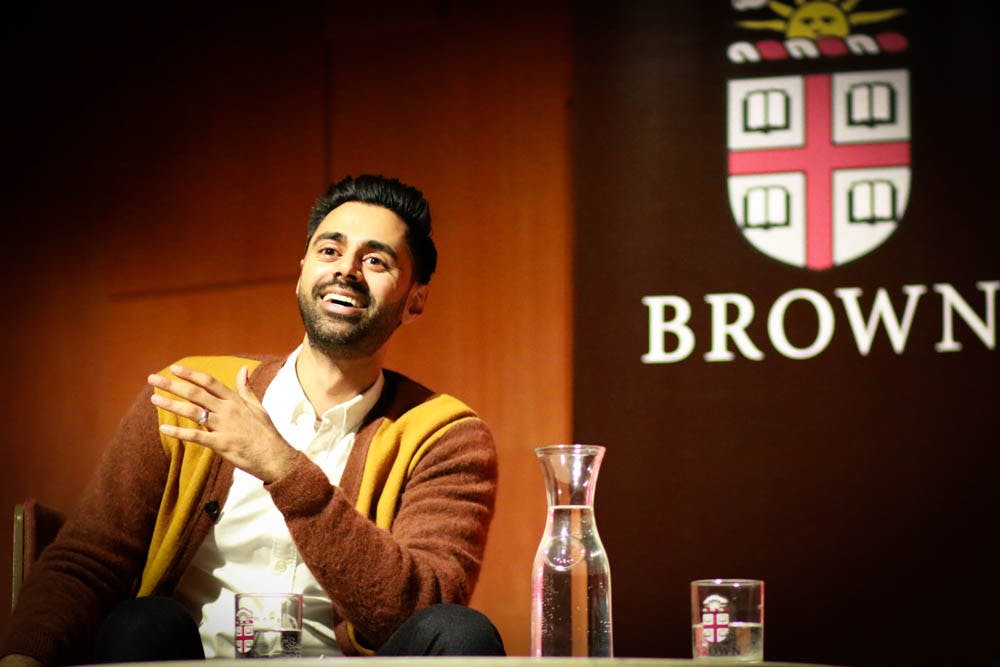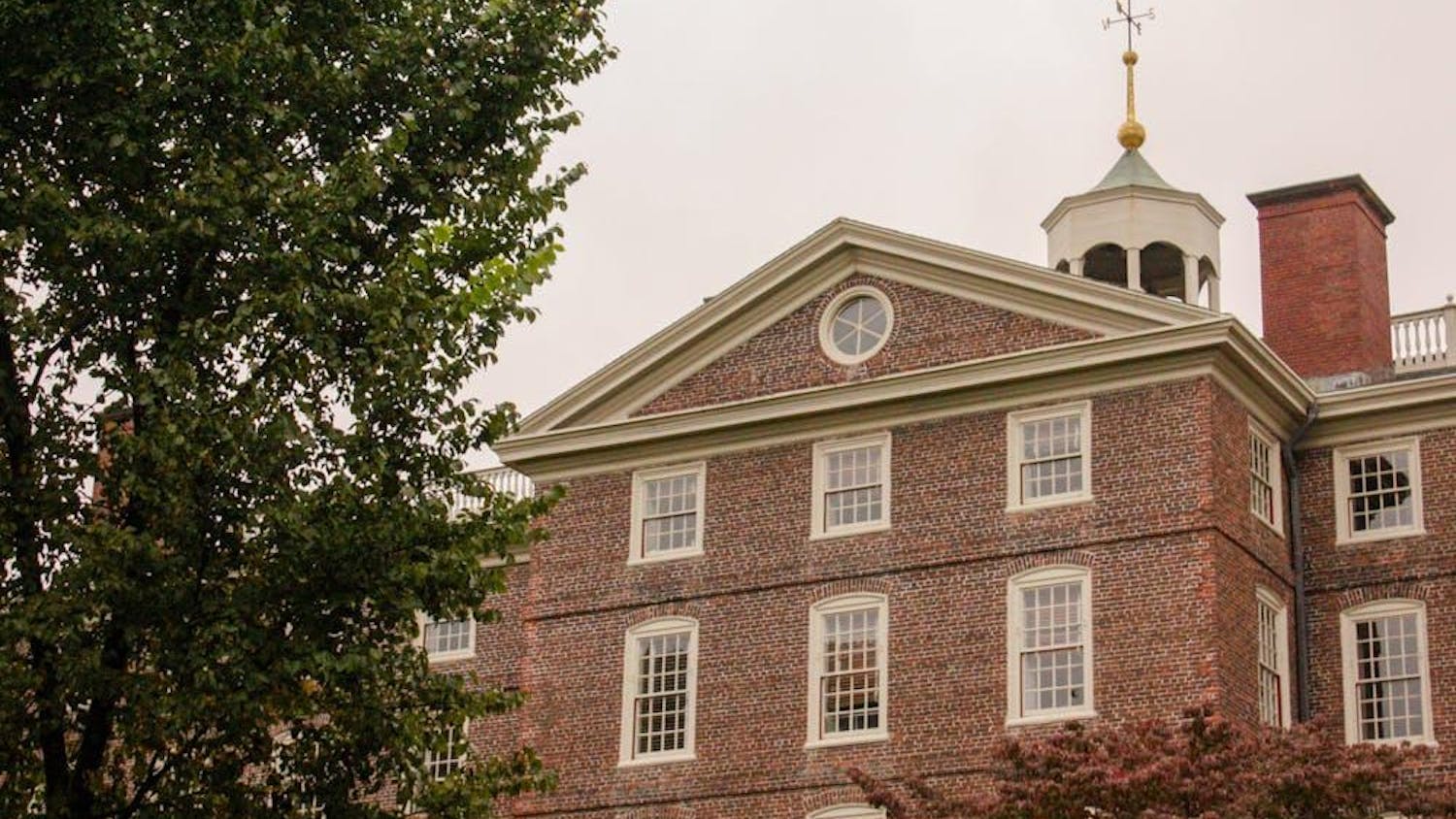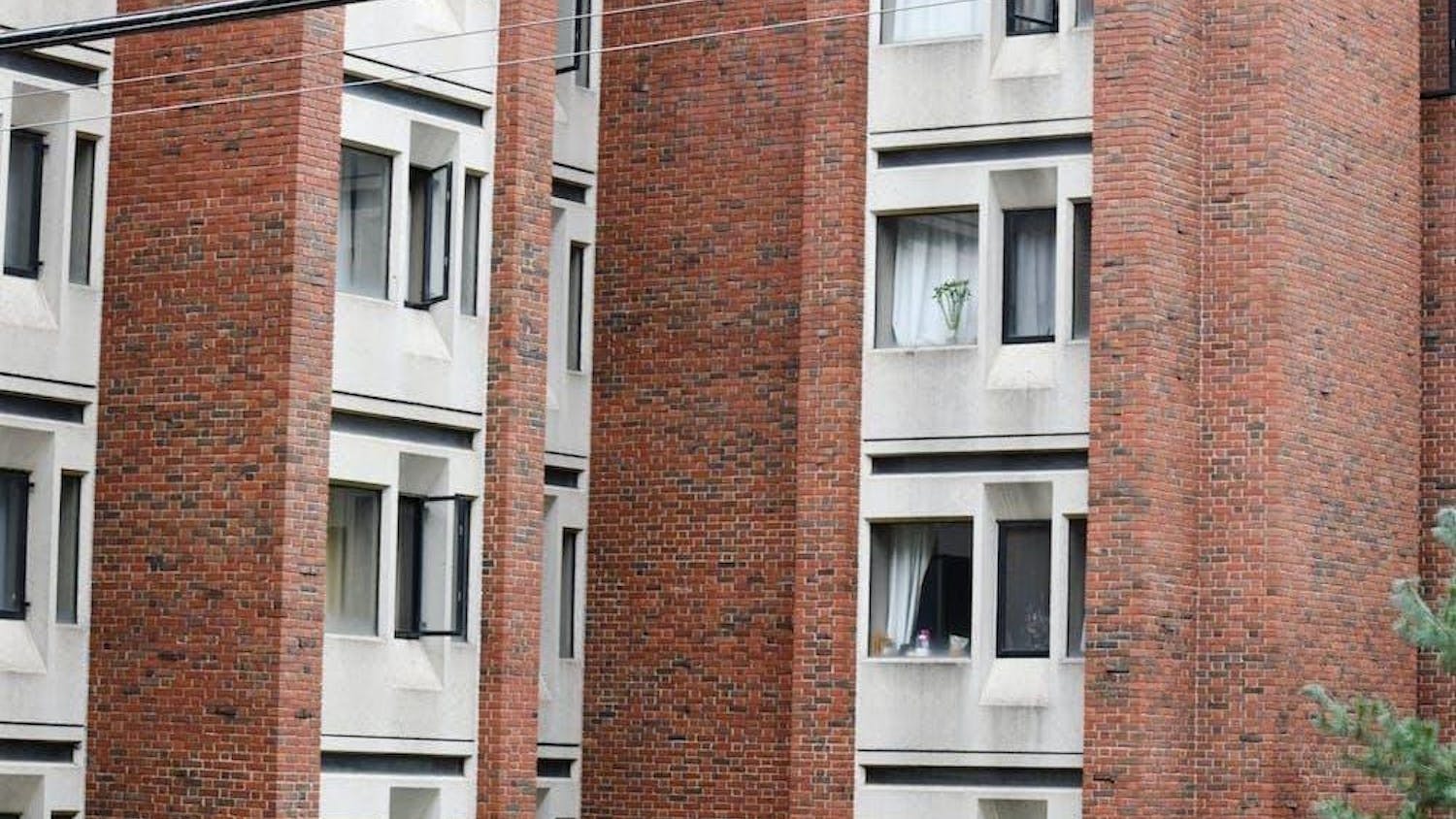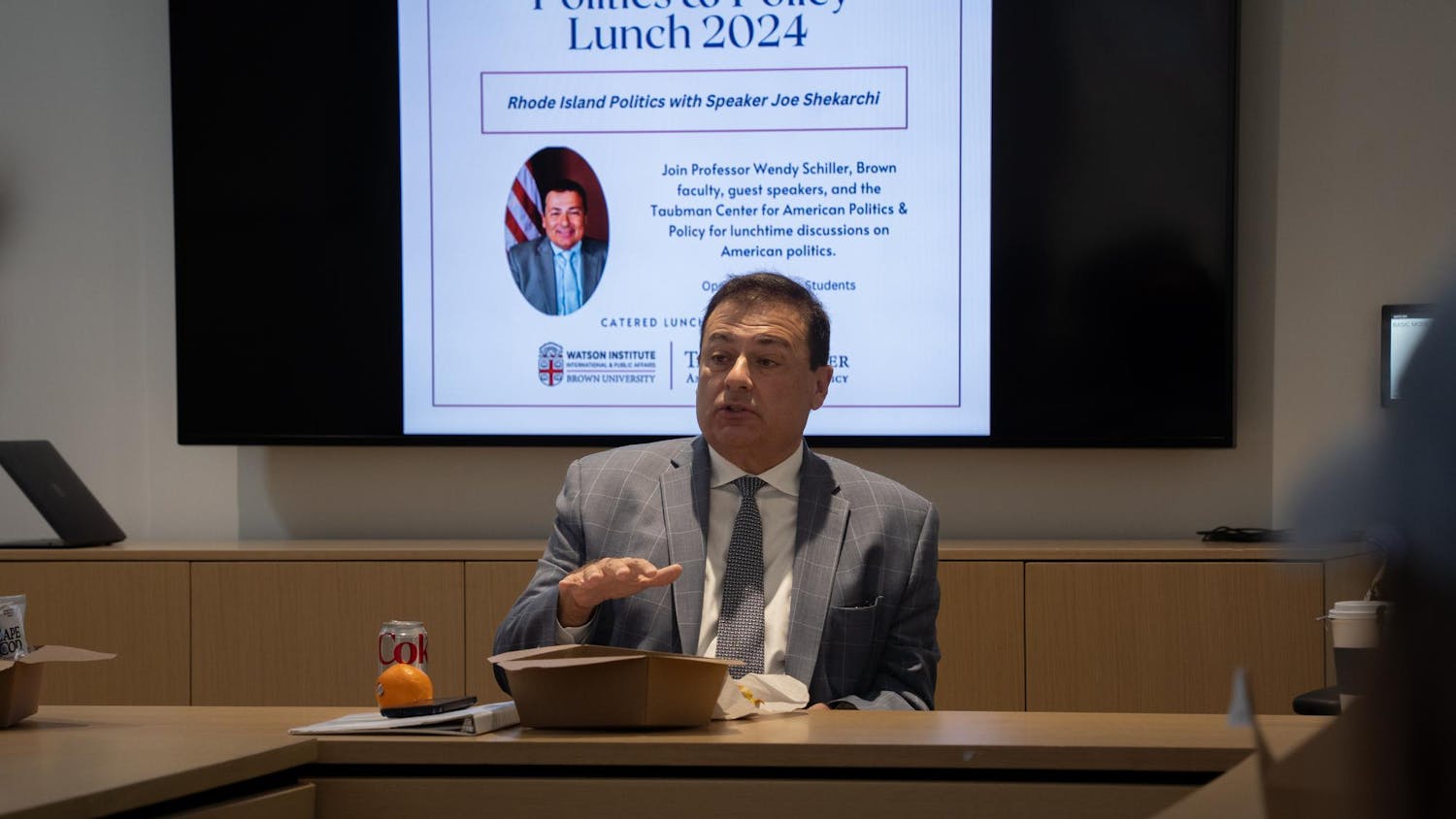When Hasan Minhaj was growing up in Davis, California, he never dreamed that he would become the host of a Netflix show beloved for educating viewers on politically and socially relevant topics through comedy.
Later, when Minhaj performed for an audience of two in a college dining hall plastered with posters of his face — or, when his jokes at another college bombed so badly that the event’s organizer cut him off and denied him compensation — it might not have seemed possible that one day, college students would wait in line for hours in the windy Providence winter to hear him speak.
“Being in Davis, just New York, Saturday Night Live or the Daily Show, seemed a million miles away,” Minhaj said. But in 2014, Minhaj made it to The Daily Show in what was just the beginning of his political comedy career.
On Friday night, Minhaj recalled his early influences and outlined his comedic style to students packed into the Salomon 101 auditorium and to more watching on screens in Salomon’s lower lecture hall. Students were offered free admission to the event, hosted by the Brown Lecture Board, on a first-come-first-serve basis. By the time the doors opened Friday night, a long, winding line had stretched from the doors of Salomon across Main Green.
“Hasan is a comedian, a writer, a producer, a political commentator, an actor and a television host,” Sobhit Arora ’21 said in his introduction to the event.
Minhaj is known for his Netflix talk show, “Patriot Act with Hasan Minhaj,” a weekly political commentary show that premiered on the popular streaming platform in Oct. 2018. The show came after Minhaj’s four-year stint on The Daily Show — a fitting progression after Minhaj joked in 2017 that working for Comedy Central was basically “an internship for Netflix.” A month after performing at the White House correspondents’ dinner, Netflix released “Homecoming King”— a stand-up special filmed in Minhaj’s hometown of Davis, California, which focused on Minhaj’s upbringing, identity and personal trials — to critical acclaim.
“‘Homecoming King’ is a roller coaster of emotions that will have you crying on the floor one moment and have you laughing with your friends the very next,” Arora said. The special “is the perfect example of Hasan representing the South Asian community in a way that it has not been done before.”
After listing Minhaj’s many accomplishments, Arora concluded his introduction by poking fun at the comedian: “Unfortunately, there is one thing Hasan will never have, and that is a good SAT score.”
For audience members less familiar with Minhaj’s repertoire, this jab might have seemed unexpected. But that SAT score (Minhaj received a 1310) is something Minhaj references often — he mentions the score in the first episode of “The Patriot Act” and during “Homecoming King.” As journalist Sloane Crosley wrote in Vanity Fair, Minhaj is “in on the self-infantilizing nature of the joke, of the ridiculousness of holding on to suburban disappointments,” and within that idea “lies the core of Hasan Minhaj.”
As he conversed with Lecture Board’s moderator Nicole Yow Wei ’21, Minhaj admitted that topics like his SAT score and his childhood have made it into his comedic routines because he likes “to pick topics that scare me” in both personal and political realms.
“Comedy as an art form is built on pressure, and a punch-line releases pressure. … Things that we find too painful or humiliating — like my SAT score — it’s great fodder for comedy,” Minhaj said, noting that personal tribulations and feelings of nervousness or shame are what compose “the DNA of every great comic.”
Rooting his jokes in the details of his own narrative or in more universal queries allows his comedy to resonate with a wider audience. “I’ve always wanted to make it feel like a living room type of vibe, where everyone’s in on the joke,” Minhaj said.
Minhaj said that this is true of the show, “even in the way that we film it. … It’s kind of a hybrid between stand-up and a traditional late-night show, but you see the audience. There are moments where I’m sort of interacting with people who come to the tapings.” Sometimes this involves pointing out audience members, asking for their names or commenting on their reactions to his jokes — tactics Minhaj brought to Friday’s talk.
In terms of his comedic journey, Minhaj “kind of stumbled into it,” first realizing he was capable of engaging a room while doing speech and debate in high school. Making jokes that resonated with the parent judges often earned him extra points. When he got to college, he realized that the stand-up he watched with his friends was “just funny speech and debate.”
Now, Minhaj continues to do the same — reckoning with the awkward, terrifying or confusing realities of the modern world in front of a studio audience on “Patriot Act.” He has discussed a range of hot-button issues, from the rise of streetwear brand Supreme to protests in Sudan or the origins of fentanyl and its misuse. Even when he covers intensely serious subjects, Minhaj finds a way to make people seated in the studio around him, and on their couches at home, laugh.
When choosing topics to cover on the show, Minhaj and his team consider two main types of themes. “The first camp are stories that affect you, that affect your day-to-day-life, so things that you do care about. The second bucket are things that you should care about,” he said.
The show is currently available on Netflix in 190 countries, with clips accessible to more on Facebook and YouTube. “We’re an American show — we film in America — but we have a global reach. … I see that as an opportunity.”
During the talk, Minhaj alluded to the latest episode of “Patriot Act,” which was released on Netflix yesterday. Titled “The Ugly Truth of Fast Fashion,” the episode dives into the rise of mass-produced clothing and details the junction of social media-driven consumerism and fast fashion’s inherent unsustainability.
In this episode, Minhaj is surrounded by pink-and purple-hued screens — even the floor he stands on projects digital renderings — and his commentary is punctuated by video clips from CNN, Fox News and YouTube, as well as animated graphs, statistics and images. The graphics have come to define Minhaj’s show. “The graphics department is really trying to visually storytell,” Minhaj said. “How do we take pull quotes, data visualization, mock-ups, all of those things and tell a story?”
“The way we consume content these days, where, you’ll be at home, you’ll have your MacBook open while you’re watching Netflix, while you’re also talking to your friends on your phone. We’re able to kind of quickly sift through tons of information in real time and consume multiple different narratives all at once,” he said. The interactive, layered visuals of “Patriot Act” came as a response to this reality — freeing Minhaj from the constraints of the typical set of a late-night show.
These visuals are the brainchild of the show’s lead animator Michelle Higa Fox ’04, founder of Slanted Studios, a multimedia company. This fall, Fox won an Emmy for Outstanding Motion Design for her creative direction on the show. Zachary Silberberg ’18 serves as the show’s digital editor and creates the digital content for the show’s social media.
“Major shout out to this school because Brown University gave us two amazing people. … Brown alumni have really shaped our show,” Minhaj said.
Lecture Board intends “to bring individuals (to campus) who provide insight that complements the academic, developmental and extracurricular elements of the Brown experience,” Parisa Banani ’20, president of Lecture Board, wrote in an email to The Herald. “The way (Minhaj) describes his childhood and the seeming unreachability of comedic success, I think, displays an uncertainty that many of us feel toward our goals and dreams.”
Correction: A previous version of this article misspelled the last name of the digital editor of "Patriot Act." His name is Zachary Silberberg '18, not Silverberg. The Herald regrets the error.





